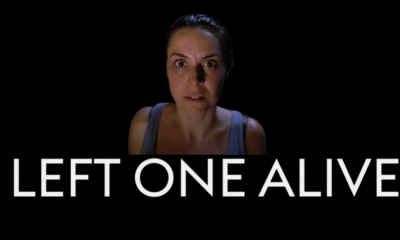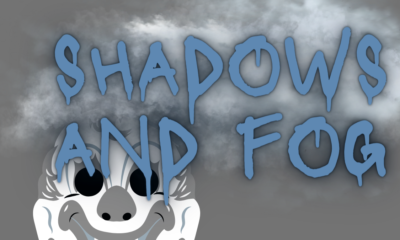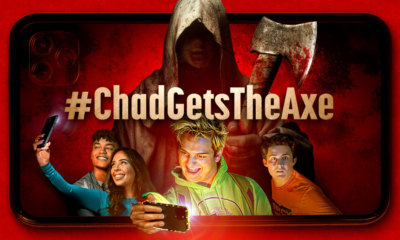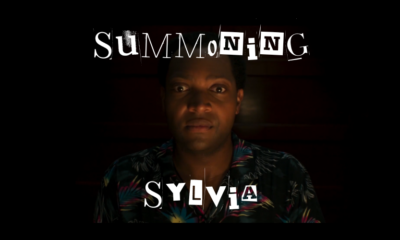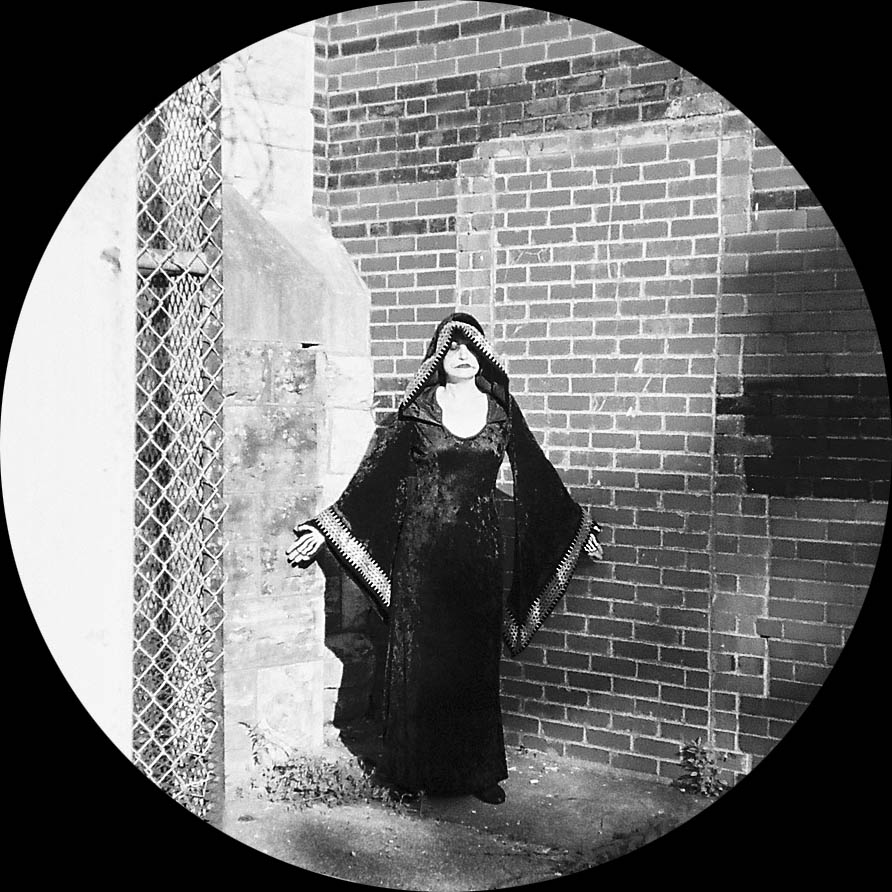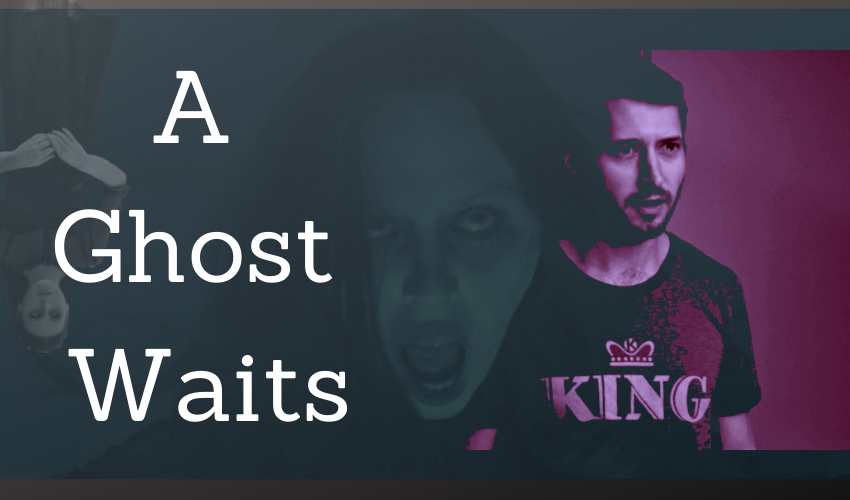
Review: ‘A Ghost Waits’…for your pizza!!!
Don’t you just hate it when a ghost ruins all your plans and makes you fall for her indie-music singin’ ways AFTER she’s stolen your precious pizza?! I hate that the worst of all! And so does our main character in this week’s movie, A GHOST WAITS.
Thanks to Arrow:
This film is brought to us by ARROW – a true indie SVOD service created and run by people that love cult films of all kinds. ARROW is building on our decades of experience in the Cult film and physical media worlds. They believe in film, from horror to action to westerns to the truly bizarre and use their experience as a distributor and our recent digital presence to deliver a very different SVOD service in ARROW.
Their approach to supporting each release on ARROW includes looking to supplement the feature films with hours of additional content that paints a fuller story of the filmmakers, genres and the movies themselves. They commission stunning artwork from some of the best illustrators and artists from around the world and work as closely as they can with the filmmakers themselves in how their film is released.
Check out ARROW today at https://arrowfilms.com/!
I want to put a trigger warning on this one for suicidal ideation/themes. So, if that’s not in your wheelhouse, I’d suggest skipping this, especially the end with “Brain Roll Juice”. Thanks and be well. – J.M.
The Plot: (spoiler-free)
Jack (MacLeod Andrews) is your typical half-neurotic, half-sweet-as-apple-pie handyman. He’s often neglected and shit on by others, including his own friends and his boss, but it’s really through no fault of his own. He likes his job and enjoys the simplicity of fixing the broken, maintaining houses, and rocking out to indie bands. He’s the kind of guy who talks to toilets while cleaning them, and making them talk back.
He’s also the type of guy who is slow on the uptake when he begins to be haunted by a dark and mysterious ghost, Muriel (Natalie Walker). So, chairs rocking on their own, lights going out, and strange dreams don’t bother him much. But push comes to shove when this ghostly apparition STEALS HIS GODDAMN PIZZA!
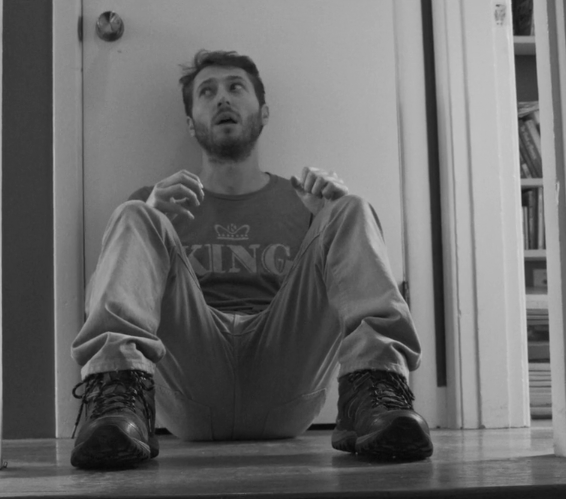
He then starts losing his shit before realizing what’s happening and why so many previous tenants of the house have moved out (ghost on both accounts).
However, frustrated, he confronts the ghost, shocking her and piquing her curiosity in him. They start to form a bond and maybe even…love?
But ghosting is a serious business and if she can’t get him to leave the house, then her ghost license is revoked, or something, and she becomes a “shadow” (which is bad news).
But as just they begin to understand their feelings, the ghost agency sends another ghost to get the job done. Can their love survive? And if so, at what cost?
Thoughts: (spoiler-free)
This is one that hurt because there were a lot of right steps done for a low-budget horror-comedy, but there were also problematic areas that could have been avoided.
They lowered the effects and made it more down-to-earth, including makeup and the very slight gore. These are effects that I could probably do if given some YouTube videos and an afternoon, but that actually enhances the indie feel of this movie.
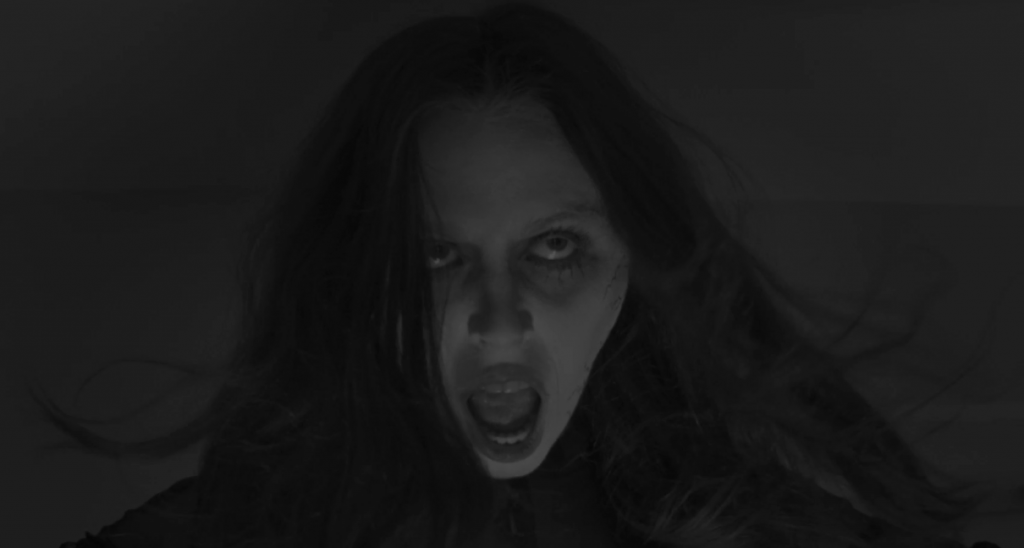
Same with the black and white. It’s not really needed, but it adds to the flavor and the atmosphere, and reminds me of old indie horrors of the early 60’s. There are some fun shots, but for the most part, it’s pretty straight-forward.
The music is filled to the brim with indie bands, which can get a bit tiring after a while because they blur together. But I enjoyed that they were mostly diegetic and a plot point. And I was also happy to see that they were actually used by the characters instead of just blaring in the background.
Okay, let’s get to the really good and the really…not-good.
The really good were the shoulders of MacLeod Andrews because he f***ing carried this thing. His portrayal of Jack was actually sweet, endearing, and relatable. Honestly, it was weird seeing a character that I related so much with during the first act especially. Yes, I have talked to toilets. Yes, I have made them respond to me. We’re friends, get over it. But seriously, his acting was tremendous in this, as were his line reads because it could have gone completely the opposite and he could have sounded like a “nice guy” instead of an actual nice guy. So, I tip my hat, sir.
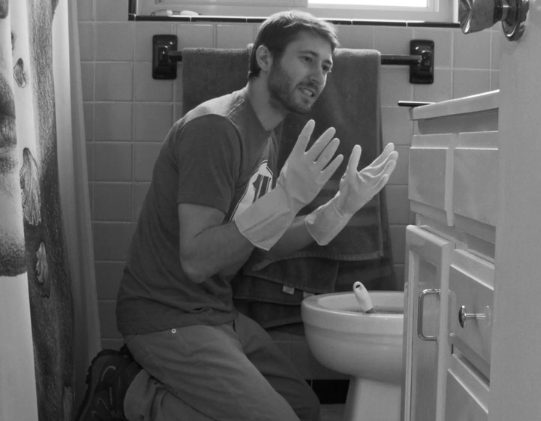
And here comes the not-good, which I’ll talk more about in the next segment, too. The writing, mostly.
When we get to the second act, it begins to unravel. Once our two mains meet, it becomes a mess. We don’t get enough character from Muriel (not backstory, character) to make her memorable or his actions justifiable. The ghost bureaucracy just muddled and slowed the story down. When you add bureaucratic rules to supernatural, it usually gets tiresome unless really well done (i.e. Beetlejuice). It’s like playing a complex role-playing game – suddenly you’re arguing about THAC0 for an hour when you just wanna go kill orcs with your bikini-clad barbarian babe.
If they wanted to add it, we (as the audience) should have learned about it before Jack, so it didn’t feel tagged on and it felt more a part of Muriel’s character. The stakes would have felt higher and we could have connected to her more as a character.
Their flirting/meeting each other was, like, an hour or two at most. They are just sitting at the table and talking for half an afternoon. This equates as love in the movie. Do we need to revisit Frozen?
We never really understand why he even likes Muriel as more than a cool undead chick to sometimes hang with. The love doesn’t feel real or genuine. It feels really forced, in fact.
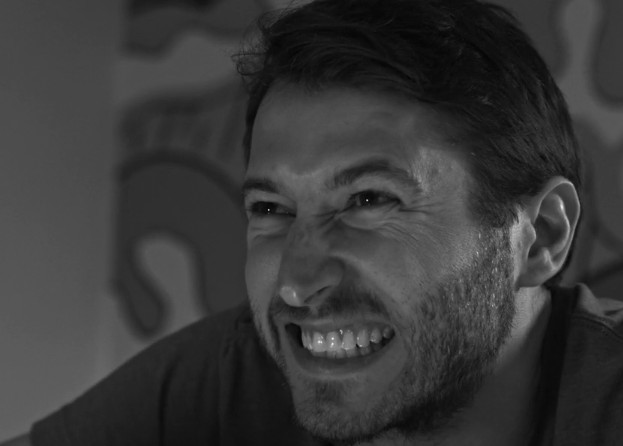
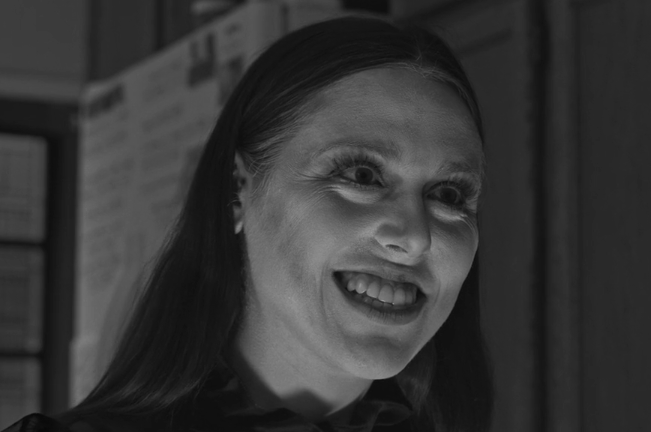
And also, just a BIG no for the line from Muriel, “What’s a movie?”
This is from a ghost who has claimed to understand people’s deepest fears from observing them and you’re telling me she’s never seen a couple people plop down and watch a freakin’ video on Tubi (please Tubi, respond to my voicemails, I love you, please notice my love!)? I call Bull Shenanigans. Hard B.S.
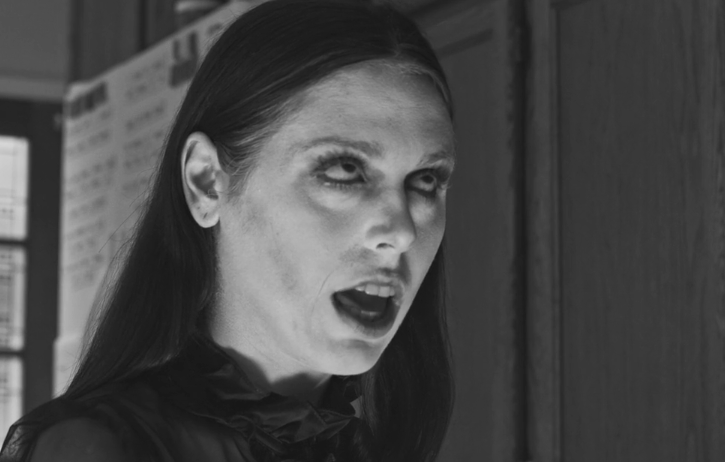
Brain Roll Juice: (spoilers ahead)
Okay, I’m not going to beat around the bush. This is a movie where a guy who has shitty friends feels lonely, meets a ghost for an afternoon, she pays attention to him so he thinks he’s in love, she likes him or whatever, but they can’t be together, SO HE COMMITS SUICIDE.
Let that seep into every crack of your soul. I’ll wait…
Suicide is the answer to this love story.
She doesn’t say, “Hey, wait a minute. Like, you have your whole life…”
Nope, she’s all smiles and thumbs-up as he sits in his car, garage doors closed, waiting to die. He even calls his boss to thank him for everything and we see a scene of his boss finding his lifeless body.
In the next scene, we see the two of them haunting the house together because true love wins and they chose not to fear the reaper.
Yeah, so…
Honestly, I am still not sure what to even say to this ending.
I keep seeing reviews calling A GHOST WAITS heart-warming and charming, and I’m just beside myself. I keep thinking I’m the only one who sees the damn gremlin on the wing of the plane and that gremlin is the alarming rise of suicides in the world.
In the United States, suicide was the tenth leading cause of death overall, claiming the lives of over 48,000 people per year. Suicide was the second leading cause of death among individuals between the ages of 10 and 34, and the fourth leading cause of death among individuals between the ages of 35 and 54. Males are at a higher risk than females, just as rural areas are higher risk than urban.
And if we still believe the theory of Durkheim’s extensive study on suicide (I know it was like forever and a day ago), Le Suicide, we can see a pattern that Jack fits into, which Durkheim called the Egoist Suicide. The Egoist suicide is usually enacted when one feels severely disconnected from their family, friends, community and society. Jack basically even says this at one point, that his life doesn’t matter because his friends don’t want him, his boss doesn’t respect him, and we never hear from his family. He is alone and lonely. He thinks he has no reason to live and one reason to die, so he chooses death.
This is depressive, not happy. The ending glorifies his decision and is played off like it was the right decision. There is no hint of hesitation from him or Muriel.
This, surprisingly, goes back to Beetlejuice, when Lydia is planning on suicide to be with the people who care about her and they tell her that life is hard, but it’s hers to live. They will always love her and be there for her especially when she lives through those challenging times. It’s Barbara and Adam’s love that supports her and drives her to keep living, and not to pull her into the bureaucratic eternity of being a ghost.
Because otherwise the relationship would be selfish and toxic.
Bottom Line:
You might enjoy this romp. There were moments that I truly did. But when it gets down to the nitty-gritty, it falls flat with its mission (a genuine romance) and it’s message (Jack completing suicide = love beats all).
 (2 / 5)
(2 / 5)
Movies n TV
Wheel of Time A Question of Crimson Is a Political Espionage Delight
Episode two of Wheel of Time felt like the beginning of a long journey. Stories are unfolding, lives are changing, and blood is spilling.
Let’s discuss.
The story
We begin this episode in the past with Elayne’s mother, Queen Morgase. It turns out her rise to the throne was a bit, shall we say, cutthroat. So when she shows up at the White Tower, Siuan is concerned.
She might have reason to be, too.
Meanwhile, Rand, Egwene, Moiraine, Lan and Aviendha are in the Spine of The World. As they travel through some of the most breathtaking lands I have ever seen on a TV show, Egwene is plagued with nightmares. We think at first that’s just her trauma working itself through her system. But we soon find out that it might not be that straightforward.
Finally, Perrin returns home to heal after his hand is almost cut in half. But when he gets there he finds the town has been infested by Children of The Light. And they’re looking for him.
What worked
There was something heartwarming in this episode about political espionage and choking religious persecution. And that is Elayne’s relationship with her family.
I have consumed a lot of fantasy content with royal families. And I have never once heard a princess call her mother ‘Mum’. I’ve never seen royal siblings get along. And I have sure as hell never seen a princess have a good relationship with her step-parent.
This was refreshing. Even though Queen Morgase is kind of a horrible person she seems like a good mother. And that’s an unexpected delight.

Of course, this is just one storyline among many. And while this can sometimes be overwhelming, in this case it wasn’t.
I’ll be honest, some of these storylines are going to drag for me. I know this because I’ve read some of the Wheel of Time books and I have an idea that not all the characters exactly pique my interest.
No one likes all the characters. No one likes all the storylines. While I am here for the political espionage between Queen Morgase and Siuan, not everyone likes it. While others might be fascinated with Selene trying to win Rand back, I couldn’t care less.
Having multiple storylines keeps everyone’s attention better. So long as things don’t get out of hand. Things can easily get out of hand. But this seems to be managed well.
So far.
What didn’t work
As I mentioned above, I’m not thrilled with Rand’s story at this point. And while it’s fine to not like a storyline when there are this many to choose from, it’s not fantastic that the one I like the least is the one involving our two main characters. And anytime we were with the team at the Spine of The World, the only thing that brought me joy was Moirain’s hat. It reminded me of Stockard Channing’s hat in Practical Magic.
The problem is that Rand is Charlie Brown with controversial magical powers. He is boring, serious, and pessimistic.
And yes, I understand that he has a heavy emotional burden and he’s the Dragon Reborn and that’s quite taxing and all. But let’s be fair, there isn’t a single person in this show that doesn’t have a heavy burden. And most of them manage to be fun occasionally.

All that being said, this episode of Wheel of Time did exactly what it needed to do. It set up conflicts at each of the three locations. It established emotional ties between the characters and the events. And it established goals for everyone.
This was, in short, a solid episode. Not groundbreaking, not mind-blowing or life changing. It was simply good. It was entertaining and moved the plot forward.
Well done.
 (3.5 / 5)
(3.5 / 5)
Movies n TV
Wheel of Time Returns With A Bang
Wheel of Time is back for season three. There are mixed feelings regarding this. Last season, there were some serious pacing issues. And some serious sticking to the book’s storyline issues. But we’re two seasons in, and we don’t give up so easily. So let’s dive into episode one, To Race the Shadow.
By the way, I highly recommend watching this episode with the subtitles on. You’ll see why.
The story
We begin this episode with Liandrin facing a trial of sorts for her rampant betrayal. She does her best to gaslight her Aes Sedai sisters into thinking that Siuan Sanche is the real traitor.

When that doesn’t work, she reveals how many Black Aes Sedai have actually infiltrated the tower.
Spoiler, it’s a lot.
In the aftermath, our whole team gathers to drink and enjoy one night of relaxation before they head out to the Tear to form an army for Rand. All is going well until they’re attacked by myriad creatures and a sentient axe.
What worked
This episode was long. It had a run time of an hour and eleven minutes. And a lot of that run time was spent in heavy dialog scenes.
Fortunately, these were well-done scenes.
If you’re going to have a lot of talking scenes, there are good ways and bad ways to do it. Last season, we saw lots of examples of the bad way to do it. But this episode did it well. For one thing, other things were going on while conversations were taking place. The characters are drinking, playing games, walking through an interesting city. And the scenes themselves didn’t stretch out. They weren’t repetitive. We heard what the character had to say, then we moved on.
It was also nice that the point of these scenes wasn’t just info dumps. We had character development. We had romantic interactions. We had plot development and foreshadowing.
Overall, this episode felt like what it was. A moment of calm before a storm.
Taking a step back, I’d be remiss if I didn’t address the fight scene at the start of the episode. Because it was epic.
The magic looked amazing. The martial arts that went along with it looked fantastic. The costumes were beautiful. It was just incredibly fun to watch.
More than that, it was emotional. We lost some characters in that fight that were important. And it was clearly emotionally shattering for many of our characters, who found themselves betrayed by people they trusted.
So many of them.
It was a great way to open the season.
What didn’t work
Despite that, this episode wasn’t without its flaws.
First off, there were a lot of dialog scenes. And they were good scenes, as I’ve already discussed. But it was one after another after another. And when your episode is, again, an hour and eleven minutes, it’s maybe a little much to have so much chit-chat. Couldn’t some of these conversations, important as they were, have been moved to maybe another episode?
Finally, I want to talk about Egwene’s travel through the arches.

I feel like maybe there were some deleted scenes here. Because there must have been more to that visit than what we saw, right?
We could have seen Egwene battle Rand. That would have been badass and emotionally devastating. We could have seen her with a quiet life with Rand back home at the Two Rivers. We could have seen anything except for the quick clip of Rand in a bloody river, followed by Egwene being shoved back out in a bloody shift.
Bad job. But at least it wasn’t an extended scene of Moiraine collecting bathwater, and then taking a bath while looking sad. If we’d started this season with another scene like that, it might have broken my brain.
Amazon dropped the first three episodes at once. So we’ll be back soon to talk about episode two. See you then.
 (4 / 5)
(4 / 5)
Movies n TV
Entertaining as hell: Eight Legged Freaks (2002) Review
Early 2000s is a special era for the industry. It accepts the cheesiness and corniness of movie making, in turn producing some gems in their own right. Eight Legged Freaks starring David Arquette and young Scarlet Johanson is a horror comedy about giant spiders who overtake a small town. As crazy as that premise sounds, the movie surprisingly has a ton of heart and is super entertaining. Let’s review, shall we?
Plot
We start Eight Legged Freaks with a shot of toxic waste spilling into the water supply of Joshua, a spider farm owner. He is friends with Mike, one of our protagonists, who is a science geek and a spider enthusiast. Mike notices something quite right upon visiting Joshua, but no one takes him seriously. We are then introduced to the rest of the crew. Mike’s mother Samantha, the town sheriff, is too busy chasing Ashley, his sister, who is dating the town mayor’s son Bret (something Samantha does not approve of). We also have Chris, who returns to the town to save his father’s legacy in the town mines. He has opposition from Wade, Bret’s father, who wants to use the mines for his business ventures. Lots of drama going on that will only get juicier once the spiders get loose.
The creepy crawlies quickly dispose of Joshua and make their grand appearance after Ashley rejects Bret’s advances, abandoning him in the middle of a desert. A glorious chase sequence ensues as the spiders make their way towards the town, wreaking havoc on its residents. In a true horror fashion (which the movie acknowledges), it takes some convincing from Mike and then from Samantha for the town to take the threat seriously. The tongue-in-cheek style of narrative adds the comedy aspect to a movie that would otherwise burn out fairly quickly.
The remaining characters hide out in a shopping mall as it’s the only somewhat sturdy building in the area. This doesn’t last long as the spiders break in, forcing them to run through the mines. Their resources to fight the creepy crawlies off are limited as the methane gas doesn’t allow them to use firearms. Such conditions require resourceful thinking from Chris, who uses perfume to fend off the leader of the spider group and save himself during the climax of the movie.
Character dynamics are not forgotten once the action kicks in. We have Chris confessing his long-term feelings for Samantha which she knew all along, which provided some comedic relief. Bret also reunites with Ashley and apologises for being an asshole. Mike finally gets the appreciation he deserves as his knowledge saves the townsfolk more than once during the whole ordeal.
We end the movie with the town’s radio show person telling the story as an urban legend during his segment. This brings it into question – how much of it happened the way he said it did? We can only guess…
Overall thoughts
Eight Legged Freaks is a fun creature feature with some self-aware commentary on genre tropes that doesn’t take itself too seriously. The acting is good, the pacing fitting and the characters are likeable enough for you to want them to make it through. Definitely a must watch, if you don’t suffer from arachnophobia, that is.
 (5 / 5)
(5 / 5)


